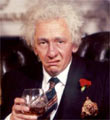Isn't that like saying that if something doesn't exist you can't think about it.Originally posted by ZaZu@15 October 2003 - 11:53
Doesn't one have to believe in the concept
of an Supreme Being to have an opinion as
to weather one exist or not?
(does that make any sense?...i just got up)
Rather rules out most of mankind's inventions, doesn't it.









 Reply With Quote
Reply With Quote









Bookmarks